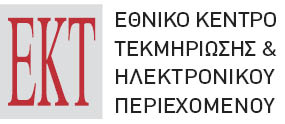Το τεκμήριο παρέχεται από τον φορέα :
 Εθνικό Κέντρο Τεκμηρίωσης και Ηλεκτρονικού Περιεχομένου (ΕΚΤ)
Εθνικό Κέντρο Τεκμηρίωσης και Ηλεκτρονικού Περιεχομένου (ΕΚΤ)
Αποθετήριο :
Εθνικό Αρχείο Διδακτορικών Διατριβών
| ΕΚΤ ΕΑΔΔ



